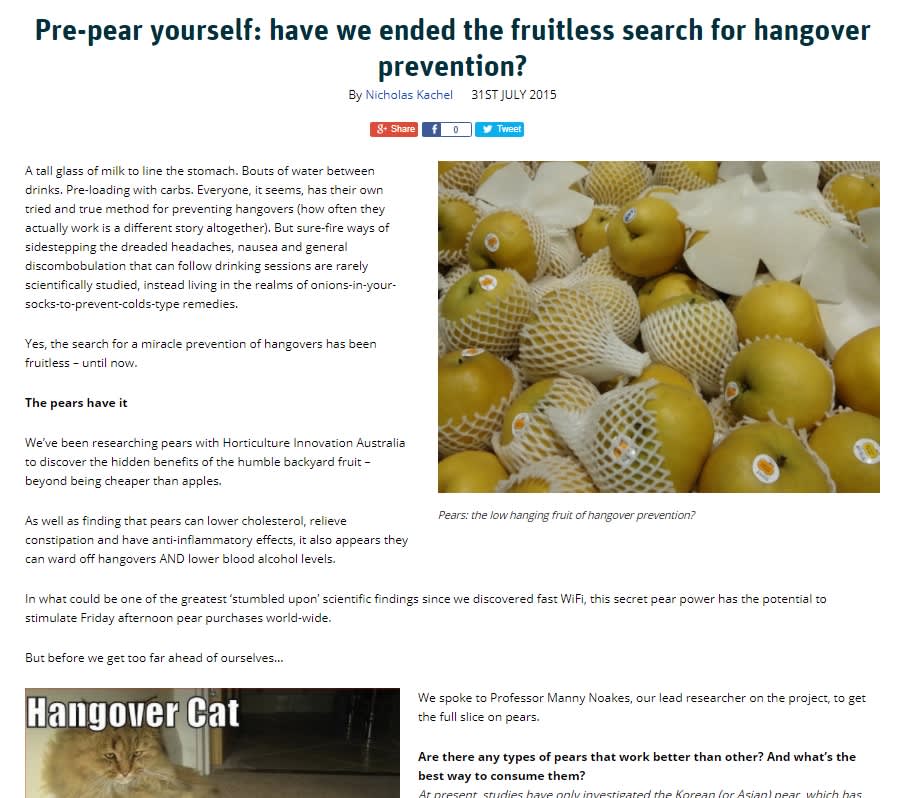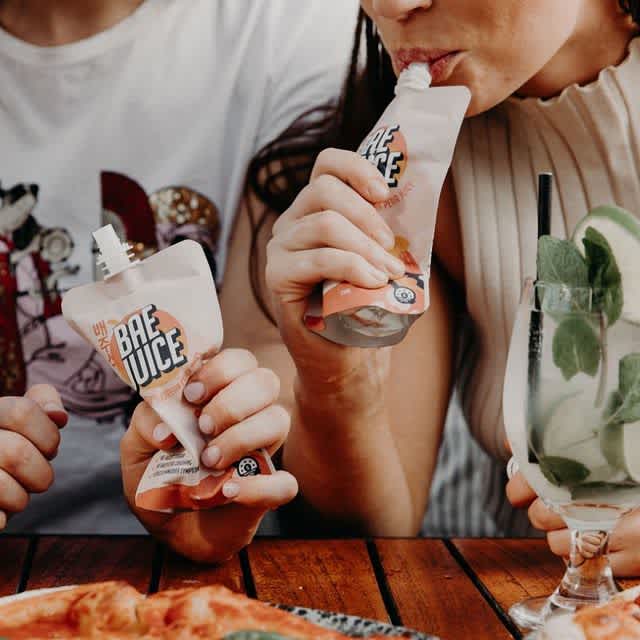I held in my hand a pastel pink plastic pouch which contained 120ml of Korean pear juice that should – supposedly – alleviate the symptoms of hangover I would inevitably be feeling tomorrow.
“Cheeky weeknight drinks?” the back of the pouch asks. It knows its audience. “You’re in luck because we have sourced, squeezed, and packaged an all natural hangover remedy used to heal dry mouths and sore heads for centuries”.
I was heading into what would likely be a long and fairly purposeful drinking session on a school night. It was a Wednesday and my housemates who have lived together for several years were embarking on what may well be our final meal together as a house. It called for celebration and it necessitated wine. I knew I would need something to try and stem the flow if I was to be at all productive the following day.
Apparently, people in Korea consume pear with their beverages. This not only helps lessen the effects of a hangover, as the chemical within the pear apparently makes alcohol less toxic to your body. The Koreans ought to know a thing or two about drinking as they are by far the world’s heaviest drinkers, consuming more than double what the Russians drink. The average Korean drinks the equivalent of 13.7 shots per week.
“It’s a huge deal over there”
All this boozing means they have a strong affinity for the pear, something that Bae Juice co-founder, Tim O’Sullivan noticed when he spent some time there. “It’s a huge deal over there”, Tim explains, “I came upon it just doing some bar hopping”. Apparently, everyone drinks pear juice before they drink alcohol.
“I drank a couple of pear juices in Korea at the local 7/11, went bar hopping, and I woke up feeling pretty damn fresh. I just couldn’t believe it. That was my first experience with it and from that day onwards, I’ve just lived and breathed the pear”.
I don’t actually tend to suffer too badly from hangovers. I hardly ever get nausea and I’ve never thrown up the next day. But, being English, I probably over-indulge on occasions when the situation presents itself and, as such, am more than familiar with the cosmic uncertainty and foggy, anxiety-ridden days that follow.
“It was bad, don’t get me wrong, but it was nowhere near as bad as I should have been feeling”
Thus if something promises to allow me both my cake and eating it, I will be more than happy to accept the challenge. The night in question I consumed two pear juices, per Tim’s recommendation for a “bigger” night as, unknown to me, none of my housemates had work the next day and were happy to continue pouring the vino until the early hours.
The next day I awoke feeling… not terrible. I mean, it was bad, don’t get me wrong, but it was nowhere near as bad as I should have been feeling. I was intrigued, and decided to take this experiment further in pursuit of the noble calling of scientific understanding.
Over the following weeks I experimented with alcohol consumption and pear juice. While the juice did certainly seem to mitigate the effects of a drink or two, it did struggle to bandage the wounds of heavier drinking sessions.
“Just takes the edge off”
To be expected, Tim assured me. He positions the product not as some miracle cure but as something that “just takes the edge off”, which, if you’re prone to feeling completely out of sorts the day after, could be quite attractive.
I wanted to find out further though what exactly was going on here – despite Tim’s probably accurate warnings that people are less interested in the science and more in having a working product. I got in touch with The Commonwealth Scientific and Industrial Research Organisation (CSIRO) whose study back in 2015 sparked a media storm when it revealed preliminary information that, yes, pears can cure a hangover.
It wasn’t only the media who jumped on this, as Bae Juice and competitor brand Pre Pear (arguably a better pun) both got their start through reading this and both cite the information as the science that backs up their claims.
Intriguingly however, the study in question had been removed from the CSIRO website and the main researcher who had been involved in the work was no longer with the organisation. After doing some digging and bouncing between current and former employees, many of whom declined to speak on the subject, I finally got on to the Communications Advisor who very helpfully informed me that the page had been removed and the report somewhat buried due to its distracting nature. Probably too many people like me asking the same questions to the serious science body.

It turns out though that the study was not in fact a study at all. It was a literature survey that CSIRO had done for the industry body Australian Pears in order to sure up nutritional claims and boost interest in eating the humble pear. So they were essentially doing a marketing exercise, one which may have got a little bit out of hand.
The main researcher quoted in the now deleted story CSIRO ran on their blog – which formed the main body of evidence for the claims – stated that the research she had seen was limited but did appear to show that eating (or drinking) a specific kind of Korean pear (so not pears in general, just to make that clear) did appear to have alcohol mitigating effects.
“Reductions were seen in blood acetaldehyde levels, the toxic metabolic thought to be responsible for the hangover symptoms”
The fruit of the East Asian pear tree known in the Latin as Pyrus pyrifolia act on the key enzymes involved in alcohol metabolism, alcohol dehydrogenase (ADH) and aldehyde dehydrogenase (ALDH) “to speed up alcohol metabolism and elimination or inhibition of alcohol absorption”. In particular, “reductions were seen in blood acetaldehyde levels, the toxic metabolic thought to be responsible for the hangover symptoms” when consuming pear juice prior to alcohol.
So it is pretty much in line with what Bae Juice are claiming, despite being slightly distorted in overall clarity and intention. The studies they looked at used a hilarious-sounding “14 item hangover symptom scale” to show that drinking 220ml of juice from that pear does appear to have specific effect on concentration the following day.
Bae Juice, however, is only sold in 120ml pouches. So to get the full effects, you may need to double up or even quadruple up (which I tried, only to come to the conclusion that if you’re so far gone you think you need four Bae Juice, you’re probably beyond help).
The Comms Advisor at CSIRO mentioned to me that they have been in regular communication with Bae Juice and Pre Pear to tell them that they do not support nor validate the claims they are making about their products and that they find the association frustrating. Although the papers do inculcate there is some support here, it’s not the same as having the nation’s leading research institute back them up.
“It’s not a cure-all”
So, in the end, would I recommend Bae Juice? I think the answer is yes. It’s not a cure-all and you can’t expect miracles from this stuff but if you’re looking to feel slightly less like a trash-person the day after copious alcohol consumption, it’s probably a sensible option. Having said that, making sure you eat a decent meal and consuming plenty of water while also getting a fairly early night will also do wonders for your hangover. Then again, those things don’t always go hand in hand with a wild night so maybe reaching for a pouch of pear juice is the best you’re going to get if you’re determined to treat your body like a bin.


